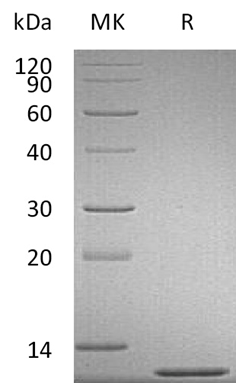#CR09, Recombinant Mouse CCL2
Recombinant Mouse C-C Motif Chemokine 2 is produced by our E. coli expression system and the target gene encoding Gln24-Arg96 is expressed.
- Accession: P10148
- Known As: C-C motif chemokine 2; Monocyte chemoattractant protein 1; Monocyte chemotactic protein 1; MCP-1; Platelet-derived growth factor-inducible protein JE; Small-inducible cytokine A2; Ccl2; Je; Mcp1; Scya2
- Mol Mass: 8.5 KDa
- APMol Mass: 12 KDa, reducing conditions
- Formulation Description: Lyophilized from a 0.2 μm filtered solution of PBS, pH 7.4.
- Endotoxin: Less than 0.001 ng/µg (0.01 EU/µg) as determined by LAL test.
- Purity:

Greater than 95% as determined by reducing SDS-PAGE.
- Reconstitution
Always centrifuge tubes before opening. Do not mix by vortex or pipetting.
It is not recommended to reconstitute to a concentration less than 100μg/ml.
Dissolve the lyophilized protein in distilled water.
Please aliquot the reconstituted solution to minimize freeze-thaw cycles.
Storage
Lyophilized protein should be stored at < -20°C, though stable at room temperature for 3 weeks.
Reconstituted protein solution can be stored at 4-7°C for 2-7 days.
Aliquots of reconstituted samples are stable at < -20°C for 3 months.
Shipping
The product is shipped at ambient temperature.
Upon receipt, store it immediately at the temperature listed below.
- Background
For Research or Manufacturing Use Only, Not for Use in Diagnostic or Therapeutic Procedures.

